Rioters United! 20 Years Since the Poll Tax Riots
Trafalgar Square, London. Wed 31 March 2010
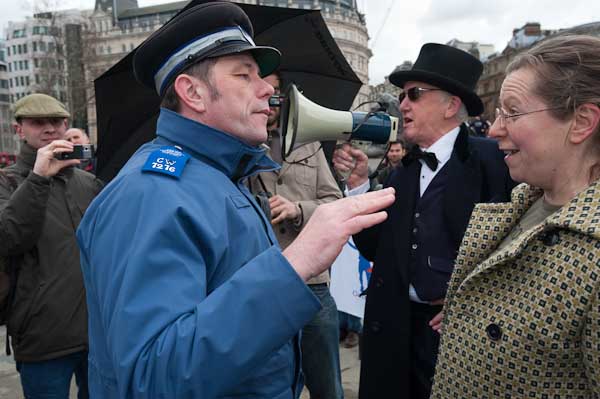
This PCSO has just got to be joking if he thinks anyone here will take any
notice!
more pictures
'Rioters Re-United!' held a short rally with around 30 people in Trafalgar
Square to mark the 20th anniversary of the Poll Tax Riots and to announce
an Anti-Election Campaign.
Twenty years ago today, according to speakers at today's commemoration of
the Poll Tax Riots in Trafalgar Square, it was the London mob who brought
Thatcher down, and they were there again on the anniversary to commemorate
this, as well as to promise that the mob were still in business and to pronounce
sentence on politicians.
Chris Knight, one of the leading figures behind last year's April 1 demonstrations
at Bank announced that the Four Horseman of the Apocalypse who led the marches
there would this year on May Day be dragging our political leaders (in effigy
at least) from their various HQs to stand trial at a people's assembly in
Parliament Square. Since the event is called 'Carnival of Death' I think we
can take it that the sentence has already been passed, and as Knight reminded
us, the only good politician, the only honest politician is a dead politician.
Of course no party leader will actually be hanged, and the police should
not make the mistake they made last year at Bank of confusing the rhetoric
with reality, which led to their ridiculous over-reaction, with squads of
riot police psyched up to batter largely innocent and joyful protesters -
and the death of a bystander. In case they read this, let me repeat, this
is called a carnival; if you want to take part, come ready to dance.
Others talked briefly about some of the other battles on the streets of London
in past years, including the Battle of Wapping when Rupert Mudoch moved his
newspaper empire there from Fleet Street and the various fights against racists
in the East End from Cable Street in the thirties and much more recently.
Shortly after the speeches started, a police community support officer came
to tell those taking part that they were not allowed to hold protests or other
events in Trafalgar Square without permission. When he was laughed at, he
brought over a Heritage Warden who told us the Square was the property of
the GLA (Greater London Authority), and that permission was needed for events.
Fine said those present. The GLA is a public body; we own it, this is a public
place and we give ourselves permission and intend to continue. Trafalgar Square
is not just a public place, but one that since its building in the 1830s has
been a traditional place for demonstrating radical dissent. It was a tradition
that those present were determined to continue.
The PCSO stood a few yards away and phoned a friend, and soon he was joined
by around a dozen police officers who also stood around watching. Fortunately
they had enough sense not to try and stop the commemoration, which ended after
around 30 minutes when the organisers decided it was time to go down the pub.
As the event ended, copies of the anti-Election manifesto and a suitably
defaced poster showing the leaders of the Labour, Conservative, Liberal Democrat
and BNP leaders were distributed by the Whitechapel Anarchist Group. This
Election they say, Use your cross wisely, under a picture of the four leaders
in the cross-hairs of a gun sight, and attached to the bottom is a 'Free Gift'
- a safety match, with the message " Burn Your Ballot". On Election
day they intend to hold a mass burning of ballot papers in a Whitechapel Park
(I hope they remember they will need the matchboxes.) As they say "It's
time to end the unjust, corrupt system of terror and build a fair, equal society
that will benefit the majority. We all know voting doesn't change anything
and our collective apathy allows this folly to continue. It’s time for
REAL change. It's time for revolution."
It may be time, or even long past time, but I think there is no chance of
it happening. The one area on which their manifesto is curiously lacking is
the environment, and pressures from this seem likely to bring civilisation
as we know it to its knees as it fails to adapt. Although I agree at least
to the extent that voting changes very little, I will still go and cast my
vote on May 6, even despite knowing that the candidate I'll choose for a party
that seriously recognises the environmental challenge has virtually zero chance
of success.
more pictures
Ethiopians Protest Bloodthirsty Tyrant
Downing St, London. Wed 31 March 2010
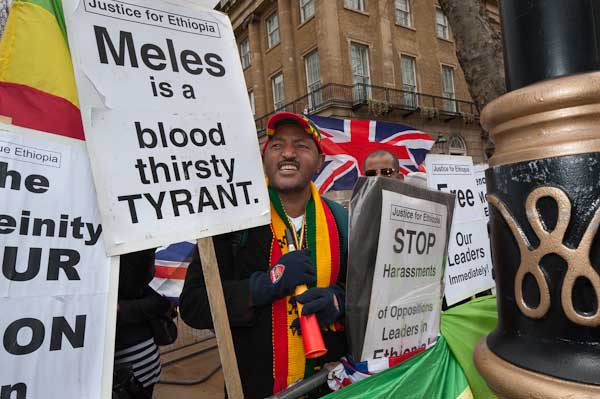
Ethiopians gave Meles Zenawi a noisy reception at Downing
St
more pictures
Ethiopians came from across the UK to demonstrate at Downing St where Meles
Zenawi was co-chairing the UN climate finance group, demanding the UK stop
appeasing the Ethiopian dictator, and calling for the release of opposition
leader Birtukan Mideksa and other political prisoners in Ethiopia.
The noisy and colourful demonstration lasted from 10am until around 5.30pm
when Zenawi was driven away under high security, by which time I had long
gone home.
Zenawi became chair of the Tigrayan Peoples' Liberation Front (TPLF) in 1985
when it was one of a number of military groups fighting in the Ethiopian Civil
War. He became the leader of a coalition of rebel groups, the Ethiopian People's
Revolutionary Democratic Front (EPRDF) when it took power in 1991, and has
been Prime Minister since 1995.
Although Zenawi set up some democratic organisations in the country, his
control of the military has made Ethiopia an effective one-party state. The
leader of the main opposition Unity for Democracy and Justice (UDJ) party,
Birtukan Mideksa (or Midekssa), a former judge, was sentenced to life imprisonment
after her party won over a third of the seats (despite much vote-rigging in
favour of the government) in the 2005 election. Pardoned and released in 2007,
her pardon was later revoked and she was arrested again on December 28, 2008
to serve her life sentence. Amnesty International launched an international
campaign for her release in November 2009. Recently she was named as honorary
chair for the Ethiopia and Horn of Africa conference next week in Washington,
DC.
Many others have also been imprisoned for political reasons in Ethiopia,
and the Committee to Protect Journalists (CPJ) in 2007 name the country as
"the world's worst backslider on press freedom over the previous five
years." In January this year Ezedin Mohamed, the Ethiopian editor of
the Muslim-oriented newspaper Al-Quds was jailed for a year for criticising
Zenawi, the fifth journalist to be imprisoned there for similar offences.
As well as Ethiopians, the demonstration also included Somali opposition
supporters opposed to Zenawi, sometimes called the "butcher of the Horn
of Africa."
Human rights violations and corruption are rife in Ethiopia, and food aid,
eeducation and jobs all depend on membership of the ruling party. His opponents
regard Zenawi as a bloodthirsty tyrant and call for him to be brought to trial
at the ICC at The Hague on charges of genocide.
Despite this, the Ethiopian regime still receives both substantial financial
support for the USA and the EU. The Ethiopian government is the largest recipient
of UK budget support in Africa. Human Rights Watch (HRW) have accused it of
war crimes in the Somali regions of Ethiopia and against the Anauk communities
in Gambella in 2003-4. As the protesters were saying, it is time for our government
to think again and withdraw support from the regime. Ethiopia needs our aid,
but it should not go through this corrupt regime and we shouldn't be propping
it up.
more pictures
Ford/Visteon Workers March For Pension Justice
Unite Offices to Parliament Square, London. Wed 31 March 2010
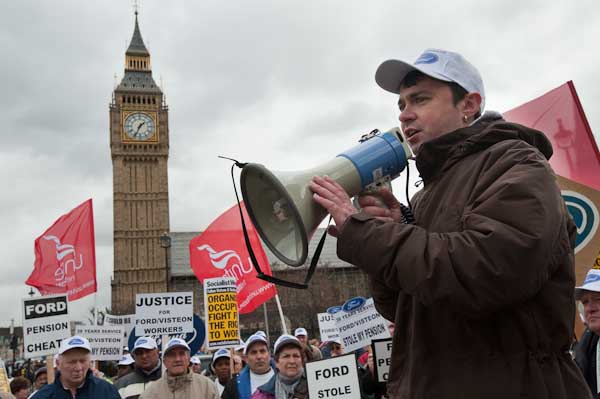
Rob Williams speaking to the marchers in Parliament Square
more pictures
Around 500 Ford/Visteon former workers and their supporters marched
through London to demand the return of their pension funds stolen when Visteon
closed its UK plants a year ago.
In 2000 the Ford Motor Company decided to split off some of its
parts factories as Visteon, 'An Enterprise of Ford Motor Company',
and at the time of the split having the same shareholders. On transfer to
Visteon the employees were given a firm undertaking that their conditions
and pensions would remain exactly the same as they had been with Ford. During
the rally opposite the Houses of Parliament, one of the former workers from
Enfield held up the 'Blue Book' - Ford's 'Agreements and Conditions
of Employment' and its replacement, identical except for its 'tangerine'
coloured cover and Visteon logo.
The actual words of the agreement made with the workers by Ford in 2000 stated:
"Accrued seniority and existing terms and conditions, in particular
pension entitlements, will be transferred to the new employment contracts.
For the duration of their employment, terms and conditions of existing Ford
employees, who transfer to Newco [Visteon] will mirror Ford
conditions (inc. discretionary pensions in payment increases) and in their
respective countries (lifetime protection)."
A letter from Visteon UK Ltd to employees dated 30 January 2001 included
the promise "If you join the Visteon UK Pension Plan…..you
will receive the same pension benefits as you would have received from your
Ford Pension Fund based on the current and future provisions of that scheme."
Some of the pensioners had paid into the Ford pension scheme for 30 or 40
years and now have lost up to 50% of their pensions, as Ford/Visteon have
reneged on these "cast iron" guarantees and the 3000 former employees
now have to rely on the less generous government Pensions Protection Fund.
A year ago, workers at the Visteon factories in Belfast, Enfield, Swansea
and Basildon were told Vistoen had been closed down and were given 6 minutes
to leave the site. Workers in Belfast and Enfield responded with factory occupations
and sticking these out with the support of their union, Unite, after a month
of struggle forced Visteon/Ford to give them the redundancy pay they were
entitled to under their agreements with the companies.
The pensions were not covered by the agreements reached at that time, and
the battle by Visteon ex-workers to get their money back continues.
Around 500 of them gathered outside the Unite headquarters in Holborn at
noon, and after some short speeches while waiting for the last coach to arrive
set off to march to Downing St, led by Unite’s National Officer for
Motor Components, Roger Maddison, proudly wearing his gold medal from the
Belfast Visteon occupation, and Rob Williams of the Visteon Pension Action
Group from Swansea.
Many of the marchers wore hats and t-shirts with the Ford logo, but with
the name replaced by the word 'Fraud', which succinctly expressed their view
of the company's action.
At Downing St, there were some problems in delivering their petition; it
does now seem unnecessarily complicated and difficult to get access to our
elected government, hiding away behind their tall gates and high security.
Its both an expression of and doubtless fuels their paranoia over terrorism
far in excess of the real threat.
The marchers went on to a rally in Parliament Square which was addressed
by Maddison and Williams as well as other former Visteon workers, as well
as by Basildon and East Thurrock MP Angela Smith and Plaid Cymru Assembly
Member Bethan Jenkins who had joined workers on their early morning coach
journey from Swansea. A long list of MPs had sent messages of support - and
there was also one from Tony Benn as well as several prospective candidates
and local councillors.
On behalf of Unite, Roger Maddison said: "The Visteon pensions story
is another example of the ugly face of global capitalism playing dirty with
people’s financial security in old age. Unite will pursue this through
the courts, if necessary, to get justice." They are demanding that
Ford meet its pension obligations of £350 millions to its former employees.
He was able to report a meeting with Pensions Minister Angela Eagle the previous
day and some kind of official enquiry into this pensions scandal seems likely.
more pictures
Release the Gaza Protesters
Home Office, Marsham St, London. Tue 30 March 2010
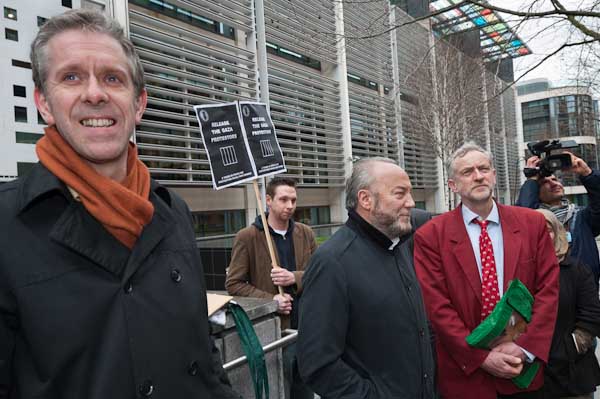
Chris Nineham, George Galloway MP and Jeremy Corbyn MP outside the Home Office
more pictures
A small group of protesters came to the Home Office on Tuesday evening to
protest against the trials of protesters, mainly young Muslims, against the
Israeli invasion of Gaza last year and the draconian sentences which are being
imposed.
The event was organised to mark the handing in by two MPs, Jeremy Corbyn
and George Galloway, of a petition with more than 1200 signatures organised
by Stop the War against the sentences imposed on these young men for largely
minor offences, often committed in the heat of the moment following provocations
by police.
Particularly worrying are the actions of the judge involved who is said to
have told many of those charged before the trial that he had seen the video
evidence from the police and Sky News and on that basis he advised them to
plead guilty.
Having apparently pre-judged their trials, when sentencing he went on not
as was expected to mitigate the sentences for those who had followed his advice
and pleaded guilty, but to give many of them lengthy prison terms which he
stated were intended to serve as an example to other members of their community
not to behave in this way.
The idea of such "exemplary" sentences is in my view repugnant,
and an abuse of the human rights of those sentenced. Sentences should fit
the crime and take account of mitigating circumstances, and should definitely
never reflect the prejudices of a judge or the wish of the constabulary for
revenge.
Those demonstrators who took proper legal advice were doubtless urged to
plead not guilty, and so far all who did have had their cases dismissed. In
the case of one of them, Jake Smith, the defence was able to show film of
him being assaulted by police before the alleged offence took place.
As someone who was at these demonstrations taking photographs, I was certainly
aware of the violent attacks by riot police including as their targets many
in the crowd who did not appear to be behaving violently, as well as some
disorder in the crowd - and was lucky to avoid some of the placards, bottles,
shoes and bags of flour thrown at police lines.
But so often it seemed fairly clear that those who the police was ordering
to move back were in fact unable to do so because of the press of people behind
them. Although it is hard to see how such events can be policed entirely without
disorder, it seemed clear to me that some of what happened was a result of
police action. The evidence of police intimidation and violence on film, photographs
and from witness statements is considerable and growing, and Stop the War
are part of a campaign to have all charges dropped against the protestors.
If our judicial system were truly even-handed and concerned with justice
we would see police on trial as well as a very much smaller number of demonstrators.
Among those police on trial would of course be those who assaulted Smith,
as well as the large group of officers who carried out an unprovoked assault
on protesters in the underpass at Hyde Park on their way to the embassy.
At the Home Office things were rather quieter, with short speeches from George
Galloway and Jeremy Corbyn, before the two MPs accompanied by representatives
from the Palestine Solidarity Campaign, British Muslim Initiative and Stop
the War went into the Home Office to deliver the petition.
At the doorway they were met by a security man who told them they could not
come in and could not deliver a petition for security reasons; journalists
were at this point ordered off the premises by the security staff. The deputation
insisted they were going to deliver the petition and made it clear they would
wait in the entrance until someone came to receive it. Jeremy Corbyn got on
his phone to the Home Secretary's Office, and the protestors outside kept
up the pressure by chanting. Thanks to his phone call and the presence of
a noisy demonstration, eventually someone came down to talk briefly with them
and take the petition.
They came out and reported on the events to the protesters outside and the
protest continued for around 20 minutes with further speeches.
more pictures
Protest the Pope
Westminster Cathedral. Sunday 28 March 2010
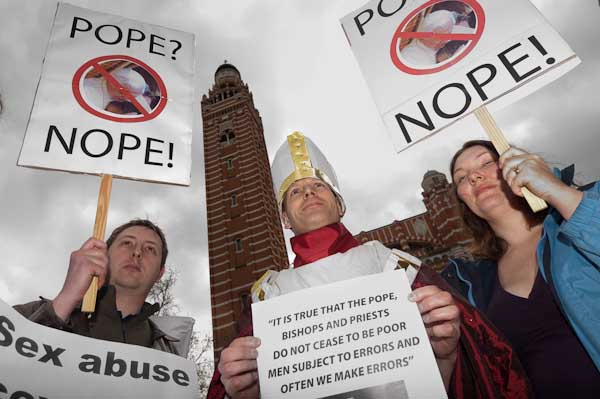
Pope? Nope!
more pictures
The 'Protest the Pope coalition' protest outside Westminster Cathedral at
lunchtime on Palm Sunday demanded the Pope resign over his covering up of
sexual abuse by priests and called for the cancellation of his state visit
to the UK.
The coalition includes eleven organisations: the British Humanist Association,
Central London Humanist Group, Council of ex-Muslims of Britain, Gay &
Lesbian Humanist Association, International Humanist and Ethical Union, National
Secular Society, North London Humanists, One Law for All, OutRage!, Southall
Black Sisters and Women Against Fundamentalism. The largest banner was for
London for a Secular Europe, though there was also one for the National Secular
Society and many Outrage! posters; both Peter Tatchell of Outrage! and Terry
Sanderson, President of the NSS were taking part.
Some people among the little under a hundred present had travelled from as
far as Cornwall to take part, along with a couple of well-known London anarchists
and others. Some people had problems getting to the event on time, including
the young man dressed as the pope, because the clocks had changed and we had
lost an hour's sleep early in the morning.
It was a quiet and peaceful protest while I was there and although quite
a few police were standing around they had little or nothing to do. There
were reports of some arguments betweent protesters and people coming out of
the Cathedral towards the end of the protest.
The continuing revelations of sexual abuse by priests and in Catholic organisations
have led to widespread calls for an effective response from the Catholic Church.
Given the involvement of the current Pontiff as Carndinal Ratzinger in sending
a letter instructing cases to be covered up and dealt with by the church rather
than the civil authorities it will probably be impossible for the Catholic
church to convince outsiders that they are taking the matter with sufficient
seriousness unless he were to resign.
Of course many - both inside and outside the church - also believe that many
of the churches policies also have to change, and call for an end to the compuslory
celibacy of priests (St Paul after all said it was better to be married than
to burn, and there has been rather too much smoke in recent years) and for
the ordination of women. Many of the leaders of the early church were women
and it is now once again common in many other churches including the Church
of England and most Protestant churches.
The 'Protest the Pope' coalition are not against the Pope visiting this country
as a private citizen, although doubtless they would demonstrate against him
if he did so, but object to a state visit. He is the head of a church which,
as well as failing to deal with childe abuse, has opposed the distibution
of condoms, increasing family sizes and the spread of AIDS in poor countries,
denied abortion to women, including the most vulnerable, opposed equal rights
for LBGT people, and rehabilitated holocaust deniers.
The Pope is also head of state of the Vatican which has not signed many major
human rights treaties and has produced concordats with many states that effectively
deny their citizens human rights.
more pictures
Save 6 Music!
Broadcasting House, London. Saturday 27 March 2010
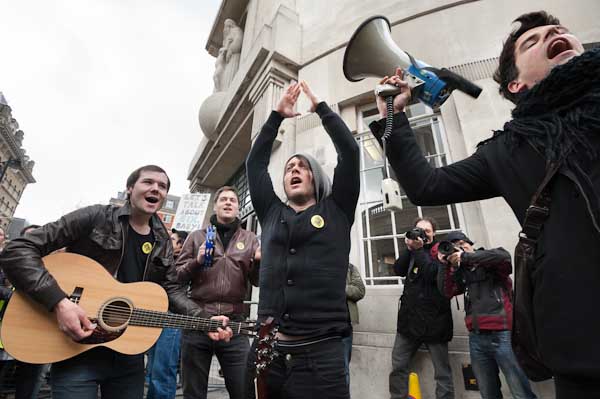
Black Soul Strangers playing outside Broadcasting House
more pictures
Approaching a thousand came to demonstrate outside Broadcasting House against
the planned closure of BBC Radio 6 and the Asian Network. Despite the occasional
heavy showers there was something of a party atmosphere as musicians performed
and presenters and union members spoke against the proposed cuts.
The protest was opened by Liz Kershaw (and Andy came later) who, along with
the others employed by the BBC stressed she was speaking simply in her personal
capacity as a licence payer. She talked about how she had become involved
with the station and how its loss would impoverish music outside the narrow
commercialism of other stations. She stressed that it was possible for the
BBC Trust to prevent the axing of the two threatened networks and that everyone
should fill in the consultation and keep up the pressure through e-mails and
letters.
Tom Robinson talked about how the BBC's plans were essentially about a narrow
'branding' of radio, and that the closure of 6 Music and the Asian Network
was essentially not about the quality of their output, the size of their audience
or the relatively small cost savings, but to fit a neat plan with simply 4
'brands' for TV and 5 for radio.
It was for many of us a chilling future, with the past strength of the BBC
being very much based on its ability to step outside the mainstream and conventional,
which are adequately served by commercial interests. If this is truly the
way that the BBC sees its future, there would seem to be little point in its
retention - and it would be hard not to agree with those who argue for an
end to the licence fee.
Other speakers included two from the trade unions representing the presenters,
although unfortunately the NUJ General Secretary Jeremy Dear who had intended
to speak had not been able to make the event, and Adam Buxton, who
came close to the end, having been busy recording a new show for 6 Music.
There were a few shouts of "Stephen!" and the response
"Just coming!". the catchphrase from his Saturday morning
6 Music award-winning comedy show with Joe Cornish. He led the protest in
a chant "What do we want?" "Leave us alone!"
"When do we want it?" "For a long time!"
Among the suggestions from speakers that was most popular with the crowd
was that the BBC could save the small amount that these networks cost by simply
firing one or two of their highly paid celebrities, some of whom are paid
similar amounts to the £9 million a year that 6 Music costs. There must
be few licence fee payers who really think people like Jeremy Clarkson are
worth such ridiculous amounts of money - even his fans. Like footballers wages
and bankers bonuses, these things have been allowed to get out of control,
and I think we would all welcome politicians putting pressure against exorbitant
pay in all these sectors.
Various groups who have been featured on 6 Music turned up to play, including
Black Soul Strangers and, according to other reports, Allo Darlin',
Mirrorkicks and The Brute Chorus although I didn't catch their names. Fans
will doubtless recognise some of them. I was impressed by them all, including
the guy from the Asian Network who sang 'a capella' on the shoulders of his
drummer.
more pictures
LIDF Press Launch
Holborn, London. Thursday 25 March 2010
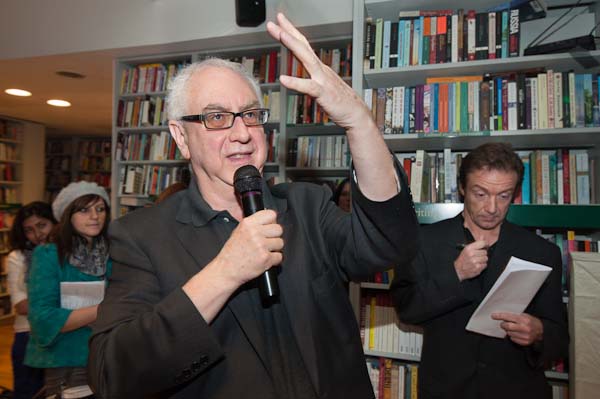
more pictures
The London International Documentary Festival (LIDF) is the UK’s
premier independent documentary film festival, screening over 130 films from
36 countries, “groundbreaking output from around the globe” in
London from 23 April – 8 May.
The LIDF is a London wide festival, with screenings, exhibitions and events
across the capital including The Barbican, The British Museum and
Ciné Lumière as well as more local venues. This year is
the fourth for the festival, which has grown rapidly and now runs for 16 days
and has branched out from film to include documentary in other media: radio
and photography.
As a part of LIDF 2010 there are two 5-day Magnum Documentary Photography
workshops, one for women only run by Olivia Arthur and the other
by Donovan Wylie.
Of particular personal interest is The Invisible City, a multimedia
event at The Hub, a work and meetings space on York Road, Kings Cross
on Saturday 24 April. Talks, discussion, films, audio and photographs about
Hackney, Kings Cross and north-east London and the changing urban environment
and how it affects those who live and work there.
Films in The Invisible City include John Roger’s
London Perambulator in which Will Self , Iain Sinclair and Russell Brand
explore the importance of the edge lands on the fringe of the city, films
from the London Refugee Stories Project, audio from Nick Hamilton’s
series Foot and Mouth and photography from Alex Bratall
and myself.
I’ll be projecting some of my pictures of the Lea
Valley over 30 years, and also showing the rather tongue in cheek psychogeographic
work, 1989,
which purports to be the first chapter of an uncompleted book about a series
of rambling walks I made with a now-deceased author.
more pictures
Light Up the Night in Hampstead
Hampstead, London. Saturday 20 March 2010
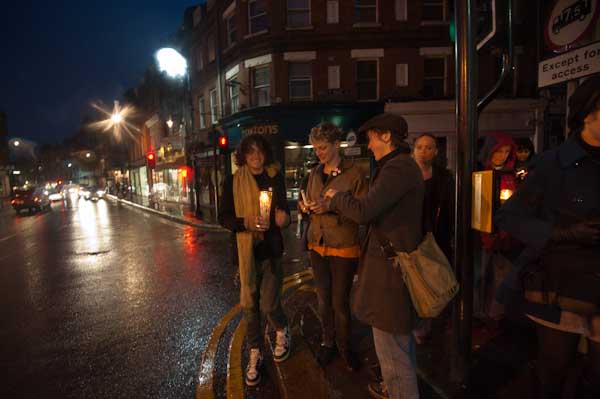
The march was led by 'The Commons' candidate for Hampstead
and Kilburn, Tamsin Omond
more pictures
A 'Light Up The Night' candlelit march to show community solidarity
against violent crime and make the streets safe for women at night took place
in the rain on Saturday night in London.
Around 30 people, mainly women, turned up to start the march in Hampstead
and Kilburn organised by 'The Commons' and their election candidate
Tamsin Omond from outside the Hollybush pub in Hampstead.
Sam Roddick, noted for her campaigning on issues related to human
rights, feminism, pornography and for taking Fair Trade into hitherto unexplored
areas through Coco De Mer, her Covent Garden 'erotic emporium', spoke
briefly about her appreciation and support for Tamsin Omond and her current
campaign to become an MP. Roddick admitted to being a "voting virgin"
who like so many others felt it made little difference which party was in
power, but at the coming election would "lose her electoral cherry"
in support of Omond, who is standing as a candidate in Hampstead and Kilburn.
In the rain and wind it was hard to keep the candles alight as the marchers
made their way down the hill from Hampstead, and there were frequent stops
to relight. The weather meant there were rather fewer people on the streets
than normal, but it was still an opportunity to hand out leaflets about 'The
Commons' and Tamsin's campaign, and most people seemed to take an interest.
The election is not Omond's first attempt to enter Parliament - and the 'Plane
Stupid' rooftop protest against the expansion of aviation there which first
brought her to public notice also got her banned from going within a kilometre
of Parliament. She defied this ban leading the 'Climate Rush' of 500 women
to its doors on the 100th anniversary of the Suffragette Rush, calling for
'Deeds Not Words' about climate change, and since then has organised and taken
part in other environmental actions by the climate rushers, often wearing
their distinctive suffragette style clothing and sashes.
'The Commons' is an attempt to get into Parliament in a more conventional
manner by standing as a candidate in the 2010 General election for the newly
created constituency of Hampstead and Kilburn. The campaign hopes to reach
people who are fed up with politicians and appeal to ordinary people, many
of whom, like Roddick have never bothered with voting because they felt it
made no difference.
They have a radically people-centred approach, believing in people and in
democracy rather than politics, in a truly joined up approach to problems
involving cooperation, coordination, openness and sustainability and in people
working together, thinking together, trusting each other and pooling their
enthusiasm. It is very much the kind of positive thinking that has worked
for the Climate Rush.
more pictures
London Living Wage Launch in Oxford St
Oxford St, London. Saturday 20 March 2010
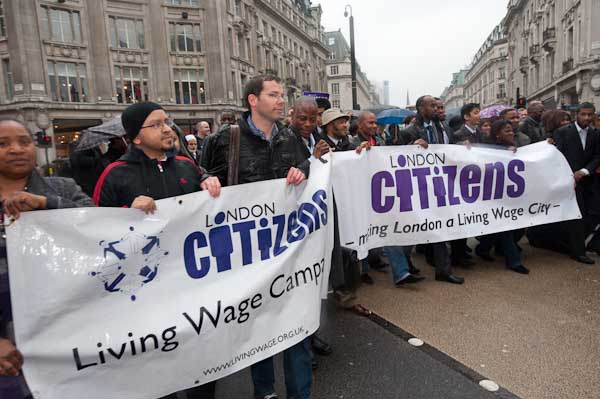
London Citizens on the diagonal crossing at Oxford Circus
more pictures
London Citizens, a grassroots charity working for social, economic
and environmental justice that has led the campaign for a London Living
Wage for workers launched this campaign into the retail sector on Saturday
20/03/2010 with a demonstration on Oxford St. After a mass crossing of Oxford
Circus with their banners small groups went off to campaign in leading stores
on Oxford Street. They aim to make every London employer a Living Wage Employer.
After a meeting and training session in a University of Westminster building
close to Oxford Street a group of more than 50 London Citizens set off with
banners to Oxford Circus, where a new diagonal crossing for shoppers was installed
in November last year. They lined up at one side and waited for the green
man before surging across behind their banners, repeating this a couple of
times after the two minute wait for the brief period when the crossing becomes
a pedestrian zone.
Despite the rain, Oxford Street and Regent Street were crowded as usual and
the event attracted considerable attention, although the event didn't seem
particularly aimed at the public who were there, with nothing to tell them
what it was about. Of course it was being filmed, and doubtless the video
will reach many more people than the event itself.
After the crossing, the protesters split into a number of smaller groups
to continue the campaign inside the larger stores on Oxford Street. They intend
to give letters to all the general managers of shops on the street inviting
them to meet with London Citizens to discuss the Living Wage.
It was a rather more low-key event than I had been led to expect, but this
is just the start of the campaign in this employment sector. The London Living
Wage campaign is now the number 1 priority for London Citizens, and since
its start has resulted in around £25 million extra wages for some of
the lowest paid workers in London, particularly for cleaners.
The Living Wage campaign which began in 2001 has had the support of both
London mayors, Ken Livingstone and his successor Boris Johnson, and the London
Living Wage, a London weighted minimum wage taking into account the higher
living costs of London is calculated by the Greater London Authority (GLA)
London Living wage Unit and in 2009 was £7.60 per hour, £1.87
above the National Minimum Wage. As well as wages, Living Wage employers also
provide fair employment conditions including holiday and sick pay and allowing
employees to belong to a trade union.
Already a number of large employers in London have become Living Wage Employers,
including well-known names such as Barclays, but there are still many people
working in London on or even below the national minimum wage and without proper
employment. And although the retail sector is one of the most profitable areas
of business in London, many of its employees struggle on less than the London
Living Wage.
more pictures
March Against Education Cuts
Kings College to Downing St, London. Sat 20 March 2010
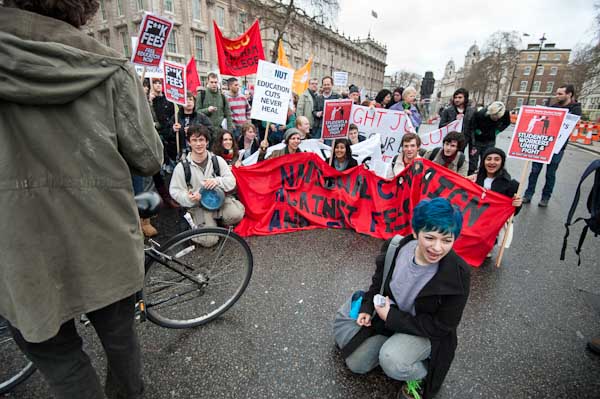
A very brief sit-down in Whitehall outside Downing St
more pictures
A couple of thousand teachers and students marched through London on Saturday
calling for a reversal of planned education cuts which they say abandon a
generation of students and will damage our economic recovery. The march ended
with a rally opposite Downing Street from where a letter from the UCU (University
and College Union) was delivered to the Prime Minister.
The march formed up on the pavement outside Kings College in the Strand,
and it soon became clear it was going to be rather larger than the organisers
expected, with the crowd spilling over into the very busy street. As well
as the UCU, there were many banners and placards from the NUT (National Union
of Teachers) as well as colleges in the Further Education, Higher Education
and Adult Education sectors. There were some short addresses to the crowd
there before the march set off, although many were too far away to hear the
megaphone.
Within a hundred yards it became clear that the police order that the march
should keep to the pavement was totally impossible, and the marchers moved
onto the street, march moved across the junction into the Strand, one large
van made a fairly determined although no police were on hand to control traffic.
As the effort to mow its way through the march but was eventually stopped
by marchers.
At Downing Street the marchers filled Whitehall for several minutes and there
was a very short token sit-down before police and stewards persuaded everyone
to move to one side of the road, but the crowd was still a little large for
the space available and there seemed to be a few dangerous incidents - including
a rather uncontrolled police horse - but fortunately no injuries as police
appeared keen to get a lane of traffic moving past without due regard for
public safety.
Speakers condemned the government - which one reminded us came into power
on the mantra 'Education, Education, Education' for now some 12 years
later proposing the largest cuts in education funding for a generation or
more, which are estimated to lead to the loss of more than 20,000 jobs in
Further Education, Higher Education and Adult Education.
These cuts will disproportionately affect the poorer and more disadvantaged
in our society, in particular immigrants and young people who are unemployed
or lacking in qualifications.
One of those leading the march was Jenny Sutton, branch secretary
of the UCU at the College of North East London. A Tottenham resident for 21
years, she is standing for the seat in the 2010 General Election against education
minister David Lammy on a platform against cuts in the public sector
including education.
She contrasts the cuts of £1.1 billion on education and local hospital
cuts in North London of £560 million with the £21 billion that
the wars in Iraq and Afghanistan have so far cost us, as well as the £500
billion given to the banks, one of which, the 84% publicly owned RBS is now
paying out £1.3 billion in bonuses. As she says "The money
is there for decent education, health and housing for everybody - where it
is spent is a political choice."
more pictures
BA Cabin Crew at Heathrow
Bedfont FC, Hatton & Heathrow. Saturday 20 March 2010
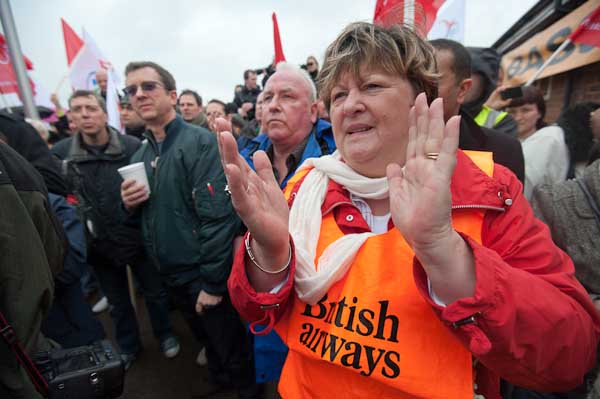
Applause for Len McCluskey, Unite assistant general secretary
more pictures
British Airways (BA) cabin crew held a rally close to Heathrow on Saturday
monring, the first day of their 2-day strike. Several hundred cabin crew came
to listen to speakers, including Len McCluskey, Unite assistant general secretary,
and show their determination to fight management plans to downgrade their
conditions and make BA into a cut-price airline. Others kept up pickets at
gates around the airport.
BA Chief Executive Willie Walsh has refused to come to an agreement despite
the cabin crew offering the company proposals saving of up to £62 million.
The rally was organised by Unite and BASSA, the British Airlines Stewards
and Stewardesses Association, a union branch for British Airways cabin crew.
Although many BA employees were at the rally, the BA management had threatened
anyone who spoke at it or appeared in TV interviews with dismissal. So although
a number of trade unionists spoke, including of course McCluskey, the voice
of the actual workers could not be officially heard, although the thunderous
applause they gave the speakers who criticised Willy Walsh and some chanting
made their opinions crystal clear.
Local MP John McDonnell spoke giving his full support for the cabin crew
in this dispute.
Pickets were in place from the early hours at entrances around Heathrow,
and although there were no reports of any trouble on the picket lines, one
photographer was reported arrested and others attempting to cover the event
ordered off the airport. Many BA planes were visible on the ground.
more pictures
Support Sacked UBS Cleaner Alberto Durango
UBS, Liverpool St, London. Friday 19 March, 2010
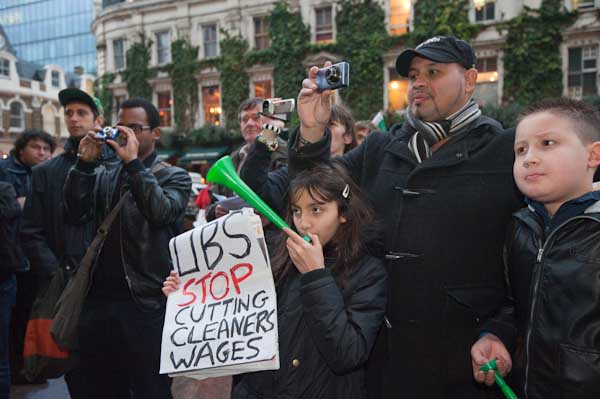 UBS
- stop cutting cleaners wages
UBS
- stop cutting cleaners wages
more pictures
Around a hundred protesters came to the United Bank of Switzerland
(UBS) in London on Friday evening, to call for the re-instatement of Alberto
Durango, sacked in February for his union activities when he approached
the contract company Lancaster over their cuts in hours for workers at UBS.
The London demonstration was a part of an international demonstration against
UBS, with other protests taking place outside their offices in 3 countries
and 6 capital cities including Zurich and New York.
The police and UBS had agreed that the protest could take place on the wide
pavement owned by the bank rather than the narrow public footpath that had
left pedestrians and protesters at hazard from public traffic.
Several speakers criticised the Unite union for its lack of support for the
cleaners in their disputes, and there were allegations that they were far
more concerned with maintaining good working relationships with the companies
that were exploiting union members than with standing up for workers rights.
Despite this, they called for those present to support the official Unite
dispute with BA and to go to demonstrate at Heathrow. The RMT union, which
represents cleaners on the Underground has been far more supportive than Unite,
and one of its members spoke at the protest. Several Unite members who support
their fellow union members in the cleaners protests claim to have been victimised
by the union.
UBS is now making huge profits and aiding and advising others with large
fortunes to make excessive profits too, but has contracted with Lancaster
to cut the wages of its lowest paid workers, the office cleaners and to deny
them their rights to organise in the workplace. During the protest a letter
was taken into the UBS offices outlining the details of the case and calling
for the re-instatement of Durango and proper working conditions for the cleaners
at the company. The protesters then occupied the steps leading up to the offices
and continued their protest there, ignoring requests by the UBS security that
they leave. The protesters were not obstructing the entrance to the offices
As a speaker from Fight Racism Fight Imperialism (FRFI) pointed
out, UBS is also involved with running schools - 'academies' that pride themselves
on promoting diversity and fairness - aims which seem a complete contradiction
to the way they are treating their lowest paid and most vulnerable staff who
are indirectly employed through Lancaster.
The UBS cleaners are a part of a larger struggle to get a London living wage
(LLW) for all workers in London - a fight that has had the support of successive
London Mayors - Ken Livingstone and Boris Johnson. The LLW is a London-specific
minimum wage, taking into account higher costs of living in the capital, and
also includes minimum holiday and sick pay entitlement and the right to join
and be represented by a trade union. The 2009 living wage determined by the
Living Wage Unit of the Greater London Assembly was £7.60
per hour, £1.87 above the National Minimum Wage, and the 2010
figure will be higher.
Among those who spoke in support of Alberto Durango was Jerry Hicks, one
of three candidates for the General Secretary of Unite in the forthcoming
elections in September and October. Also speaking was Juan Carlos Piedra Benitez,
another cleaner who has also been sacked for his union activities. A cleaner
at University College London (UCL) he was sacked last September shortly after
having been transferred there by the contractors Office & General.
Although several London universities have already become Living Wage Employers,
others including UCL - along with rich bankers such as UBS - are resisting
this, making use of companies such as Office & General who pay the national
minimum wage. Cleaners get only this despite the very unsocial hours they
are forced to work - often starting at 5.30am and also often suffer from poor
working conditions with little concern for workers health and safety, and
arbitrary management that fails to recognise basic human rights and dignity.
more pictures
St Patrick's Day Parade in Brent
Willesden Green, London. Wednesday 17 March, 2010
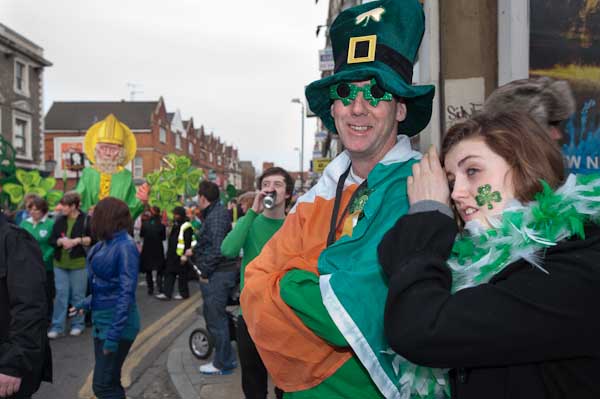 St
Patrick and the parade close to WIllesden Green Library
St
Patrick and the parade close to WIllesden Green Library
more pictures
St Patrick's Day is celebrated in bars across London but the major event
here on the day itself is a procession in the London Borough of Brent, from
Willesden Green Station to the Library, led by the Mayor, local MPs and other
dignitaries, and of course St Patrick. The Irish community in London are joined
by many others to celebrate the day. London, 17/03/2010
The London Borough of Brent, one of England's most diverse boroughs with
the highest proportion of Irish residents in this country, celebrates St Patrick's
Day on March 17 each year with a parade in Willesden Green and a series of
cultural events at Willesden Green Library Centre. Various groups including
Irish county associations, cultural groups, sports clubs and schools take
part in the annual event, and local people, many dressed in green, line the
streets to watch the procession and wave Irish flags.
It was a short procession today, but colourful and noisy, with music provided
by the Birmingham Irish Pipes and Drums who marched in the procession as well
as young musicians on fiddles, whistles and other instruments.
The programme at the library centre included Irish folk music, dancing, country
music and a youth orchestra, and there was also a St Patrick's Day Market
with Irish food and drinks. Several bars along the route were also doing good
business.
St Patrick, probably born to wealthy Romano-British parents in Somerset,
England, was captured as a youth by Irish raiders and taken to Ireland, from
where he went to Gaul, escaped and returned to Ireland as a missionary, founding
Ireland's first Christian Church in Armagh some time in the 5th century AD.
Although St Patrick's Day - March 17 - has been celebrated in Ireland for
over 400 years it only became a public holiday there in 1903, and is observed
in both Ireland and Northern Ireland. The first parade was held in Boston
in 1737, and New York followed in 1766. Although there was a parade in Dublin
in 1931, it was only in 1996 that the Irish Government began to promote the
festival. The Mayor of London - then Ken Livingstone - began official celebrations
of the event in London in 2002, but these are on the nearest Sunday to St
Patrick's Day. The only procession on the actual day in London is in Brent.
more pictures
Youth March for Jobs in Barking
Barking, London. Saturday 13 March 2010
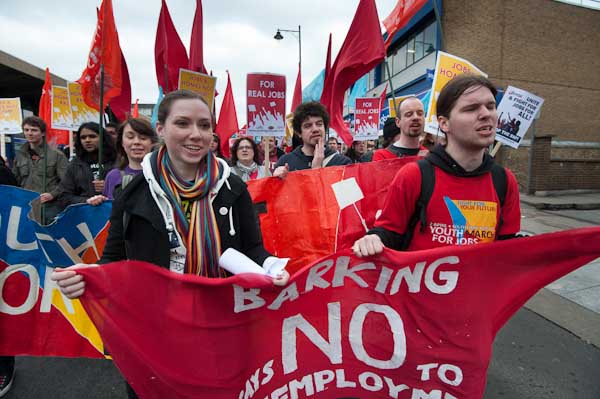
The march goes through the centre of Barking
more pictures
Two hundred mainly young people marched through Barking today calling for
the right to a decent job for all at a decent rate of pay and an end to university
fees. They called for an end to cuts in jobs and services, proper public housing
and for the government to bail out workers rather than bankers and bosses.
The Youth Fight for Jobs (YFFJ) campaign, supported by the RMT, PCS and CWU
trade unions, organises in workplaces, trade unions, colleges, schools and
in the communities for a better deal for young people and workers, let down
by the New Labour government and abandoned by the other parties.
They see it as a situation that has led to the growth of far right parties,
particularly the BNP to blame the problems on immigration; as the YFFJ web
site says: "the BNP, instead of campaigning for jobs and services, spread
division and the idea that it is Muslim, Asian, black people and others that
are to blame. An unemployed white youth from Barking has far more in common
with an unemployed youth from a Bangladeshi family in Tower Hamlets than with
the likes of Adam Applegarth, the former boss of Northern Rock, who is still
raking in the millions."
The march was held in Barking as this is now seen as the "Front Line"
against the BNP, where its leader Nick Griffin is standing in the forthcoming
General election, against Margaret Hodge, Minister for Culture and Tourism.
While previously a minister in the Department of Work and Pensions she was
often quoted as justifying increased tuitution fees for students on the grounds
of a largely imaginary "graduate premium" of increased earnings
over their working lifetime.
When MG Rover closed down she said the redundant skilled car workers would
be able to get jobs at a new local Tesco supermarket, and in 2006 she told
a newspaper that 8 out of 10 working class voters in her constituency would
be tempted to vote BNP at the forthcoming local elections as "no one
else is listening to them" over unemployment, house prices and housing
of asylum seekers in the area. The BNP won 11 seats, making them the second
largest party on the council, and many local activists blamed Hodge for the
publicity she had given them. More recently she has argued that British residents
should be given priority in the allocation of council houses.
It brought back some memories to hear the chant "Maggie, Maggie, Maggie,
Out, Out, Out!" brought back into use for another Margaret, but this
was only one of a whole page of chants distributed to marchers and in use
as they made their way through the outskirts of Barking to the town centre,
including "When the BNP tell racist lies, We fight back and organise"
and many old favourites. But an attempt at French, "Tous ensemble, tous
ensemble" failed to elicit the desired response "Grève!"
and the march had to return to English with "Strike, Strike, Strike!"
As the march went through the often busy streets, many stopped to watch with
drivers sounding their horns in approval. One or two people looked out rather
less kindly from some city centre pubs, and one man who came out of the door
of one and shouted abuse was quickly pushed back inside by one of his friends.
The march was supported by a number of local groups and trade union branches,
and at the rally at the end outside Barking Town hall there were a number
of speeches stressing the need to get involved in the fight for jobs and against
racism.
more pictures
Release Berivan from Turkish Jail
Turkish Embassy, Belgrave Sq, London. Friday 12 March 2010
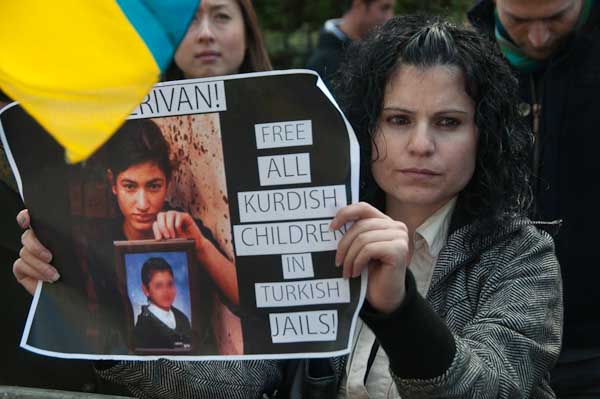
15 year old Berivan is alleged to have taken part in
a PKK meeting and thrown stones at police
more pictures
Around a hundred people gathered opposite the Turkish Embassy in London in
a protest demanding that Turkey recognise its obligations under the UN Convention
on the Rights of the Child and the European Convention on Human Rights (ECHR)
and release the fifteen year old Kurdish girl Berivan Sayaca, jailed
for 8 years for allegedly throwing stones at police vehicles in a demonstration,
and all Kurdish children currently held in Turkish jails.
The protest was organised by the Free Berivan Committee and most
of those taking part on a damp Friday afternoon were from the Kurdish community
in London. As well as placards demanding Berivan's release, some had pictures
of Turkish atrocities, while others waved flags with an image of Abdullah
Ocalan, held in solitary confinement on a Turkish island since 1999, and recognised
by many Kurds as the leader of the Kurdish people.
Turkey has over the years been the worst violator of the 47 states that have
signed the ECHR, responsible for roughly one fifth of all violations. In 2009
there were 347 negative rulings against Turkey, 21% of the total, most commonly
for violating the right to a fair trial, although there were 30 condemnations
for inhumane or degrading treatment.
Kurds are treated as second-class citizens in Turkey, and suffer disproportionately
from injustice and abuse. Berivan was detained at a rally in support of the
banned Kurdistan Workers Party (PKK) last October in Batman, a city in southeast
Turkey.
Berivan denies throwing stones and has stated she was not a part of the demonstration
but had simply stopped to watch on her way to visit her aunt. She is reported
as saying "When they arrested me they beat me up a lot. I don't understand
why they treated me like this. I am very upset here, I am in pain here"
and it was only after these beatings that she confessed to the crimes of throwing
stones, attending the unlawful meeting and spreading propaganda for an illegal
organisation.
She was tried under anti-terror legislation introduced in 2006, which allows
courts to try juveniles as adults and pass sentences up to 50 years. Here
original sentence of 13 1/2 years was reduced on appeal to 7 years 9 months
because of her age. She is just one of 737 minors who have been charged under
these anti-terror laws, and just one of 2,622 children currently held in Turkish
jails.
There are thought to be roughly 5 million Kurds living in each of Turkey,
Iraq and Iran, and about 1.6 million in Syria, with around 1.3 million now
living in Western Europe, with significant populations in North London and
also in Dewsbury.
more pictures
Kurds Remember Qamlishi Uprising
Syrian Embassy, Belgrave Sq, London. Friday 12 March 2010
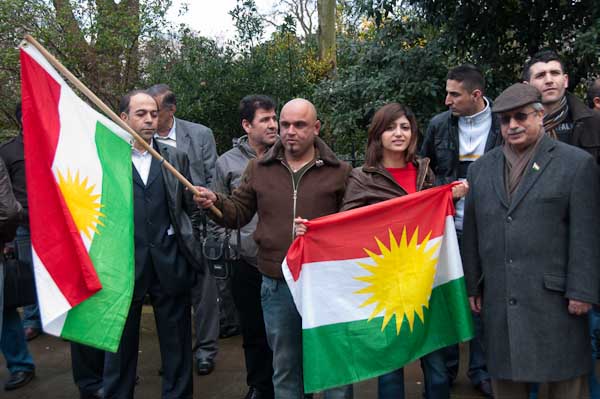
Protesters with the national flag of Kurdistan - including
I think Dr Jawad Mella at front right
more pictures
Opposite the Turkish Embassy, a group of just over 30 Kurds held a protest outside
the Syrian Embassy, commemorating the start of the '
Qamlishi Uprising’,
(also known as the
Western Kurdistan Uprising,) which began during
a football match in that city in northern Syria where supporters waved Kurdish
flags on 12 March 2004 and spread to other Kurdish towns close to the Turkish
border as well as Damascus and Aleppo which also have significant Kurdish populations.
At least 30 were killed and over 160 injured as Syrian forces brutally suppressed
the uprising.
Al Qamlishi (Qamislo to Kurds) is on the border with Turkey and also close
to Iraq; Kurds form the largest ethnic group there, along with Arabs, Assyrians,
Armenians and others, and the city is sometimes regarded as the Kurdish capital.
It is in the area Kurds designate as Western Kurdistan and there is a ‘Western
Kurdistan Government in Exile’ under its president Dr Jawad Mella,
also president of the Kurdistan National Congress, based in west London. Recently
the city has gained in economic importance as oil has been discovered in the
region around 50 miles from the city. Unrest has continued there, and in March
2008, Syrian forces opened fire on Kurds who were celebrating the New Year
(Newroz) and killed three people.
The protesters displayed the national flag of Kurdistan with its red white
and green stripes and the 21 ray yellow sun introduced in the early years
of the last century during the independence struggle against the Ottoman Empire
and adopted as the official flag by the first Kurdish Government in Exile
in 1927, the shortlived Republic of Kurdistan in 1946 and subsequently by
the Kurdistan National Congress.
Kurds are the largest ethnic minority in Syria, and the government has tried
hard to suppress their ethnic identity, including banning the use of the Kurdish
language, and denying many Kurds citizenship leaving them without rights.
more pictures
Expenses Scam MPs in Court
Westminster Magistrates Court, London. Thursday 11 March 2010
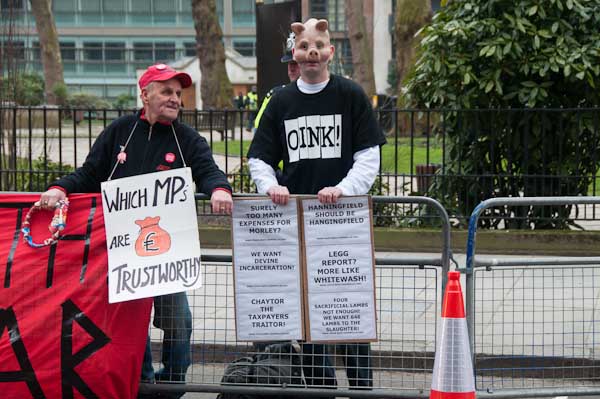
One quarter of the demonstration opposite the court
in Horseferry Road
more pictures
I've always thought the huge fuss over MPs expenses was small beer, though
a very convenient popular stick to beat them around the heads with. But their
minor crimes and fudges over expenses surely pale into insignificance compared
with taking us into the Iraq War, dancing to the bankers' tunes, privatising
huge areas of our public realm and a very, very long list of other socially
disastrous policies.
It seems a good example of the paper-clip syndrome, where managements fuss
inordinately - and take disciplinary action - over employees who take minute
amounts of personal stationery for their own use while ignoring - or even
awarding bonuses - for disatrous ineptitude at doing their jobs. And huge
golden handshakes for when they behave so badly that they have to leave.
The various bodies set up to investigate and in future supervise MPs (and
Lords) expenses will of course end up spending far greater amounts of public
money per year than the dubious expense claims cost us. Gold plated sticking
plaster over insignificant wounds. I think there is probably a very good argument
for turning a blind eye to minor indiscretions - and there is probably a valid
argument that it helps systems like Parliament to run more smoothly and aids
good government.
But it did provide a very easy target for the press and a huge volume of
often lazy journalism - much easier to run silly stories about MPs than find
the real news. And though the 'golden years' of press expenses and Spanish
practices may be in the past, there are still some impressive expenses scams
among journalists, making some of us feel it was a very grimy kettle that
was attacking an only slightly tarnished pot. But when the press says jump
the government is Gaderene in its rush over the cliff. Even though this time
it wasn't Murdoch heading the attack.
So perhaps it wasn't surprising that a demonstration outside the court where
4 of those unfortunate to be caught were making their first appearance was
rather a flop. It didn't help that when I turned up the only thing happening
was a notice saying that the demonstration had been put back four and a quarter
hours, although calling a demonstration for 9.30am does perhaps limit who
will come to it in the first place.
I went away to make a few urban landscape panoramas and returned for the
retimed event to find only eight people demonstrating. It's probably the first
time I've been at a demo where the organiser's count - seven - was actually
less than those present - perhaps he didn't count himself. There were also
around a fifty of the press, waiting with TV and still cameras for the MPs
to come out of the court. It didn't seem worth waiting form so I greeted the
few photographers I could see that I knew, took a few pictures of the eight,
then caught the 88 back to Vauxhall for the train home.
more pictures
Bow Creek at Canning Town
Canning Town, London. Thursday 11 March 2010
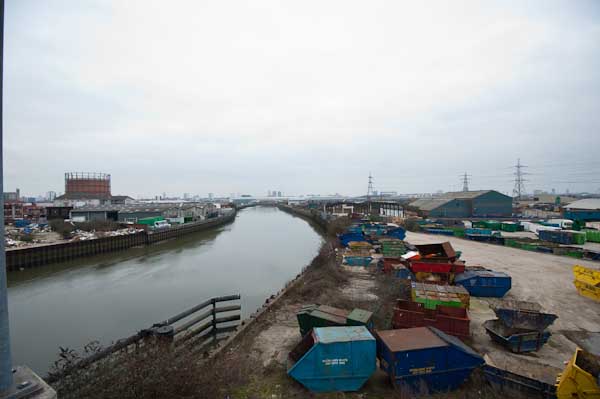
Using the Nikon 16-35 at 16mm this could be trimmed
to lose the sky. Noticeable distortion on the lampost.
It took me so long to get to Canning Town by bus from Westminster that I
didn't have as long as I would have liked to take pictures, and the sun had
gone by the time I arrived. I was trying out the Nikon 16-35, for making panoramas
and you can see some examples here.
more pictures
Mums and Midwives Reclaim Birth
Geraldine Harmsworth Park to Downing St. Sun 7 March 2010
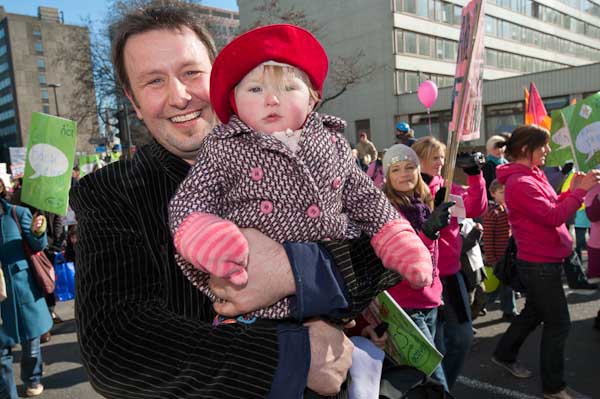
Of course there were Dads as well on the march
more pictures
More than a thousand people, many with pushchairs and young children, marched
over Westminster Bridge in London on Sunday afternoon to a rally at Downing
Street. The 'Reclaiming Birth Rally' supported the Albany Midwifery Practice
and called for the nation-wide adoption of similar case loaded midwifery services
which would look after women from conception past birth and give real choice
to all mothers rather than a lucky or privileged few. London 07/03/2010
The Albany Midwifery Practice based in Peckham, one of the most highly deprived
areas of England was widely regarded as a model of best practice and a centre
of excellence in NHS midwifery, for the support that it gave to women throughout
pregnancy, birth and the post-natal period, encouraging women to make informed
choices about how and where they give birth.
Recently King's College Hospital terminated their contract following a critical
report from the Centre for Maternal and Child Enquiries (CMACE) which King's
claim showed "serious shortcomings" over one aspect of their work,
forcing the centre to close down. Others see the decision as an attack on
alternative ways of maternity care that provide better overall outcomes and
better meet the needs of women.
Overall the Albany achieved perinatal mortality rates of 4.9/1000 considerably
below the national average and much lower than the 11.4/1000 for Southwark
Borough where it is located. Only around 1 in 7 of women in their care gave
birth by Caesarean section, compared to 1 in 4 for King's College Hospital,
and almost half (46.7%) chose to give birth at home, compared to one mother
in sixteen (6.2%) in the borough as a whole. And while nationally roughly
one mother in three continues to breastfeed their babies, the figure at Albany
was more than three quarters. The NCT, IM UK and others have expressed concern
over King's action and the rally called for an independent review of the critical
report and an inquiry into the decision to terminate the Albany contract,
with the findings to be made public.
The rally was supported by AIMS (Association For Improvements In The Maternity
Services), NCT (National Childbirth Trust), ARM (Association of Radical Midwives),
IM UK (Independent Midwives UK) and Albany Mums. It also called for a real
change in maternity care across the country, with the replacement of the current
doctor led hospital services which are so often unsupportive and even traumatic
for mothers by case loaded midwifery services following the example given
by Albany and other similar practices. These provide a much more comprehensive
service with better information and fuller support for women, including more
midwives, at no greater cost than the current system.
more pictures
Support the Iranian Women's Struggle
Iranian Embassy to Trafalgar Square, London. Sun 7 March, 2010
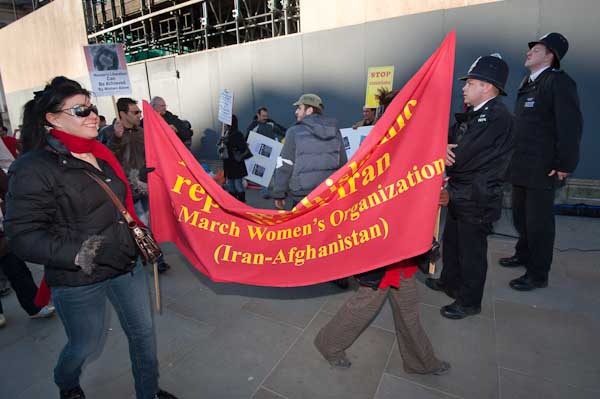
The march from the Iranian Embassy arrives in Trafalgar
Square, watched by two policemen
more pictures
More than 50 men and women, mainly Iranians, took part in a protest organised
by the 8 March Women's Organsiation (Iran-Afghanistan) to mark International
Women's Day. They protested at the Iranian Embassy against the 31 years of anti-women
Islamic laws and repression and calling for an end to the Islamic regime in
Iran before marching to Trafalgar Square for a rally. The protesters stood opposite
the Iranian Embassy in Kensington with placards calling for an end to violence
against women and stating that the forced wearing of the veil is the symbol
of Women's subjugation.
They demanded an end to the Islamic regime and equal rights for women, who
at the moment cannot travel freely and do not have custody of their children,
as well as the right to abortion, currently illegal in Iran. They also called
for an end to the stoning of women for adultery, officially this was ended
in 2002 but there have been a number of well-documented cases of this barbaric
punishment since then.
Police had coned off one lane of the road and erected pens to facilitate
the demonstration and briefly checked with the protesters what they intended
to do.
From Kensington the protesters, accompanied by a samba band, marched to Traalgar
Square, where a rally was held on the North Terrace. There were speeches and
messages from the 8 March Women's Organisation, the European Democratic Women
Movement (Turkey), Hands off People of Iran, the Organisation of Women's Freedom
in Iraq and the Million Women Rise movement.
There were then appearances by a number or artists and I stayed to listen
to the powerful singing of Gisoo Shakeri and to hear poet Ziba Karbasi reading
several of her poems. Although both performed in a language I cannot understand,
there work was still moving. Unfortunately I had to leave before the other
performances on the programme.
more pictures
Million Women Rise
Marble Arch to Trafalgar Square, London. Sat 6 March, 2010
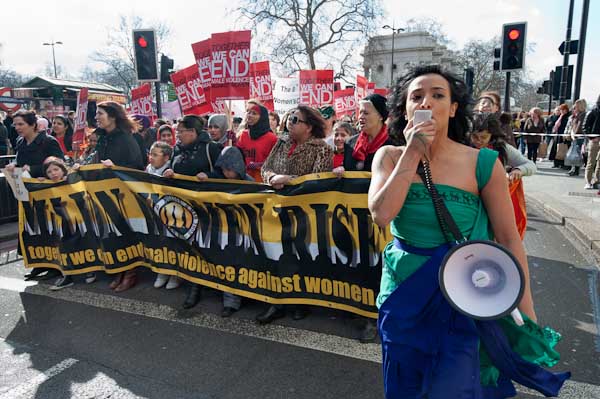
The march turns in to Oxford St
more pictures
Several thousand women marched through London on Saturday 6 March, taking
over the street as they passed as an all-women area and calling for an end
to male violence against women. The march started along London's major shopping
street, Oxford Street, before going through Piccadilly Circus and on to a
rally in Trafalgar Square.
First celebrated in 1909 by the Socialist Party of America, International
Women's Day was established in 1910 by the Second International following
a proposal by Clara Zetkin, although the date only became 8 March in 1913
when peace rallies were held on that day shortly before the First World War.
IWD rallies led to the start of the Russian Revolution in 1917 and Lenin made
the day an official "holiday", although it remained a working day
there until 1965. The UN adopted it in 1975 and in 2005 the TUC called for
it to be made a UK public holiday.
The Million Women Rise march, on the Saturday nearest to International
Women's Day - March 8th - is organised by a coalition of individual women
and representatives from the Women’s Voluntary and Community Sector,
and it aims to "celebrate and honour women’s activism, courage
and achievements and continued struggle against global male violence in all
its forms."
Million Women Rise is a part of a wider international movement to end violence
against women, and the flyer handed out on the march presented the reality
of violence for women in the UK and internationally. In this country almost
1 in 4 women are said to have experienced some form of sexual assault and
on average two women are murdered each week by a partner or former partner.
A third of all teenage girls who are in relationships suffer unwanted sexual
acts and one in four are the subject of actual physical violence.
Trafficking is a large-scale global industry, with two million girls between
the ages of 5 and fifteen being sold into sex slavery each year. Lack of health
provision is also a major problem; one woman dies in pregnancy for every minute
of the year, and most of these deaths are preventable.
There were a very wide range of groups represented in the march from WI groups
to radical feminists and including a some left-wing organisations.
more pictures
Tibet Freedom March
Chinese Embassy to Westminster, London. Sat 6 March, 2010
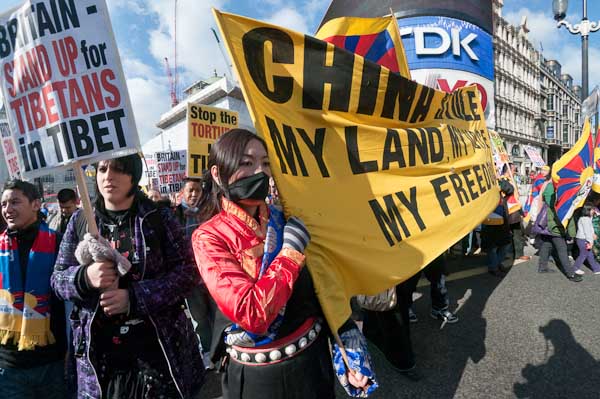
China Stole My Land, My Voice, My Freedom - the march
at Piccadilly Circus
more pictures
Around 500 people, including many Tibetans, marched through London commemorating
the 51st anniversary of the Tibetan National Uprising and calling for freedom
from Chinese rule. The protest started opposite the Chinese Embassy, where
a letter was delivered and continued through the busy shopping streets of
the West End to deliver a second letter to Downing St before ending with a
rally outside the Foreign Office.
The event was organised by a coalition of Tibetan groups in the UK and comes
two years after protests in Tibet led to the death of over 200 young Tibetans,
with many more being imprisoned. Over 1000 are still unaccounted for and two,
Lobsang Gyaltsen and Mr Loyak, were executed in October 2009. Similar events
were taking place in countries around the world.
At the start of the march there was a brief address and the Tibetan National
Anthem was sung, followed by a minutes silence in memory of the dead and prayers.
A small delegation then went across the road to the Chinese Embassy to deliver
a letter to the new Chinese Ambassador.
As in previous years, there was no one at the Chinese Embassy to take the
message, which was handed to the police officer at the main door to pass on.
The march attracted considerable attention on Regent St and particularly at
Oxford Circus and Piccadilly Circus, with shoppers stopping to watch and many
waving in support, with drivers of cars and lorries sounding their horns.
Near the front of the march was a large banner with the Tibetan's message
"China stole my land, my voice, my freedom." Among the
slogans chanted by marchers were "Tibetans have no voice in Tibet",
"China: stop silencing Tibetans"; "Britain: stand
up for Tibetans in Tibet" and "Stop the torture in Tibet".
more pictures
UAF Oppose EDL Westminster March
Westminster, London. Friday 5 March, 2010
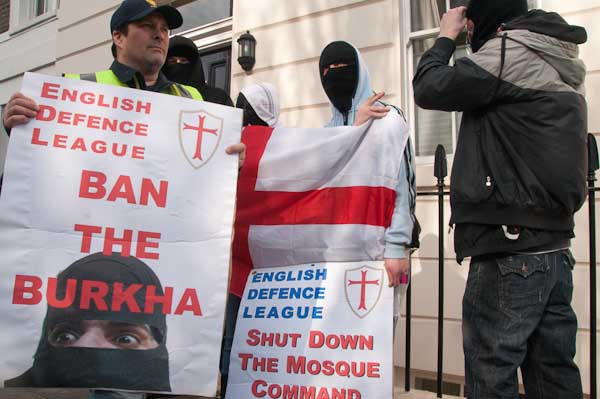
Ban the Burkha but not the Balaclava? Is that man scratching his head?
more pictures
Between five hundred and athousand EDL supporters marched to the Houses of
Parliament this afternoon in support of Geert Wilders of the Dutch Freedom
Party surrounded by police and accompanied by police horses. They were met
by around the same number of UAF counter-demonstrators, who had earlier blocked
the road but were removed by police who made several arrests and kept the
two sides well apart.
The UAF (Unite Against Fascism) demonstrators gathered in Old Palace Yard
opposite the Houses of Parliament a couple of hours before the EDL (English
Defence League) were due to arrive. While I was there they chanted slogans
against the EDL and there was a short address by MP Jeremy Corbyn. The UAF
accuses the EDL of being a fascist, racist and homophobic group of football
hooligans, and is also opposed to the showing of Geert Wilders's film ‘Fitna’,
which it says is racist and incites violence against Muslims.
In 'Fitna', Wilder use of verses from the Koran, combining them with images
of violence, and compares Islam to Nazism. Muslims regard his use of the Koran
as blasphemous abuse and he has received death threats, but he defends his
actions as an example of freedom of speech. While we may deplore his film,
the deathnthreats are unacceptable in civilised societies. But it does seems
inconsistent that Wilders is calling for a ban on the Koran in the Netherlands,
claiming that like Hitler's Mein Kampf which is already banned there, it is
a work of totalitarian ideology that incites violence.
The EDL were supposed to be gathering outside Tate Britain, but when I arrived
there was nobody there. Walking down the road a couple of hundred yards there
were a hundred or so of them on the pavement outside the Morpeth Arms and
more packed inside. I talked to a number of them and most were happy to be
photographed, many posing for the camera.
All I talked to were eager to stress that they were not racist, and were
not anti-Muslim, but only against Muslim extremists. They said they were opposed
to the increasing Islamic nature of English cities and in particular to the
suggestions that Sharia law should play any part in British justice. They
also made clear their strong feeling that they did not get fair treatment
in the press.
As at previous EDL/March for England events I've photographed, there were
a handful of black members present and around the same number of women. It
was a stark contrast to the UAF supporters, many of whom were women and represented
the diversity of backgrounds we are now used to in London, although most were
young, including many students.
Later during the actual march I did get sworn at, threatened and given the
finger, but only by a small minority of marchers, and a young female Asian
journalist seemed to attract considerably more aggravation than me. There
was also a considerable amount of clearly anti-Muslim shouting and singing,
and the placards and slogans that attack the building of mosques seem to threaten
all Muslims rather than just the extremists. The atmosphere was unpleasant,
and really gave the lie to the earlier denials of racism.
However I did not hear the songs about 'Allah' that gave offence at some
earlier events. The EDL had asked marchers not to sing these and had carefully
organised stewards, with team leaders, first aiders and others in colour coded
vests, although it was unfortunate during the short rally before the march
that one steward in particular attempted to stop photographers taking pictures.
As a police officer pointed out politely to him, it just meant we took more
pictures, particularly of him. But I did see stewards keeping some of the
more disorderly supporters in line rather firmly at times, preventing them
from attacking the press and other onlookers.
The main speaker outside Tate Britain was a Sikh, Amit Singh, who appeared
at least at some points in his address to be attacking Muslims rather than
extremist views. A police officer had a serious word with him after his speech
although this may have been connected with his use of offensive language rather
than the rest of what he said.
After the rally, the march moved off towards the Houses of Parliament where
the marchers were met by loud shouting from the UAF. There were a few minor
incidents as the march passed the crowd, but these were quickly dealt with
by police, who filtered the EDL into a pen on the north side of the road,
with the UAF being kept behind the permanent barriers in front of Parliament
on the opposite side of the road. The first thing that many of the EDL did
on arriving in the pen was to urinate against the wall of Westminster Abbey.
The two groups continued to shout at each other for at least an hour - after
which I left. There was again some racist abuse from the EDL, but they also
made a point of denying they were racist and showing off their few Black and
Asian EDL members to the press. But it stood out very clearly that the EDL
were almost entirely white and male, while the opposing UAF was very multiracial
with women probably in the majority.
Police let a few of the EDL leave (and escorted some to Westminster tube)
but most were held inside the pen. But although the UAF were kept behind barriers,
at this point they were not penned, and some soon began to drift away, and
I too decided it was time to leave. Half an hour later I could still see the
police helicopter hovering over Westminster.
Many young working class people in England do feel strongly that they have
been marginalized and neglected, particularly those who have not achieved
highly in the education system, many of whom are unemployed or in tedious
and often badly paid jobs. It isn't surprising that they are fertile ground
for the kind of racist stereotypes and myths peddled by right wing groups
such as the BNP, even if some present them in a less overt form.
Although it important that these views are challenged and that people demonstrate
their opposition to groups like the EDL, rather than simply dismissing them
as racists, attention need to be paid to the underlying causes. Which means
confronting issues of class which it has been fashionable to dismiss over
the past decades, and encouraging a pride in our heritage and in an inclusive
Britain which is a home for all our people wherever their origins.
I didn't at all enjoy being in the company of the EDL, hearing their racism
and right wing simplicities. It was an unpleasant way to spend an afternoon,
but I think its important to show these events and these people honestly.
more pictures
Holloway Protest for Yarl's Wood Women
HM Prison Holloway, London. Wednesday 3 March, 2010
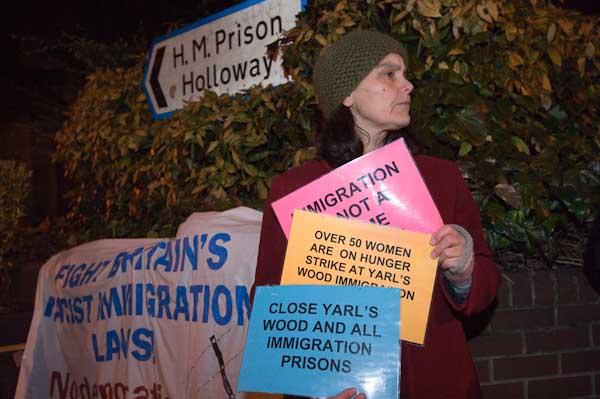 On
the main road outside Hollowar Prison wher several of the Yarls's Wood women
on huger strike were held
On
the main road outside Hollowar Prison wher several of the Yarls's Wood women
on huger strike were held
more pictures
More than 50 people protested at Holloway Prison on Wednesday evening against
the holding of five women from Yarl's Wood immigration detention centre without
trial or charge and to support the women at Yarl's Wood in the fourth week
of their hunger strike against the degrading conditions and inhumane treatment
there. Three of the women are in Holloway, one in solitary confinement, and
two are at Bronzefield Prison in Ashford, Middlesex.
On Tuesday this week, the 19 women at Yarl's Wood confirmed that they were
still continuing their hunger strike. They have reacted angrily to statements
by Home Office Minister Meg Hillier that the women refusing food were buying
food from the shop in the centre and getting it from visitors. As well as
denying the claims they have also pointed out that visitors are not permitted
to bring food into the centre.
The protesters also called for an end to the use of detention and in particular
for the detention of women with children which amounts to child abuse. They
also want SERCO guards at the centre to be prosecuted for their racist and
sexual abuse.
The loud chanting and samba band will have made the protest and its message
of support heard to the women held inside the jail, and certainly a little
jumping up and down with the music helped make those taking part outside a
little less frozen in the chill wind.
The protesters blocked the vehicle entrance to the prison, and one SERCO
prison van that arrived during the demonstration quickly backed out of the
driveway and went away. A van full of police also arrived and came and asked
a few of the demonstrators what was going on, and then stayed to watch but
made no attempt to move the demonstrators while I was there, though after
half an hour or so an officer did remove a 'incident tape' that had been stretched
across the prison entrance.
The Home Office and SERCO have also issued denials of the allegations of
violent attacks, beatings, victimisation and abuse at the centre, but as well
as the many consistent allegations made by over 50 women in the centre, there
are also mobile phone images of some of the injuries, and women who have been
released since the main incident have given interviews.
Journalists and MPs have been asking questions about the mistreatment of
detainees at the centre, and lawyers have attempted to challenge the treatment
of detainees as a breach of their human rights under European Convention articles
3,5 and 8. Certainly many of those who have seen the system, either as detainees
or visitors - even on carefully conducted tours - have been scandalized by
what they have seen. We should be treating these people, many of whom have
fled from traumatic situations in their own countries in a far more humane
fashion.
more pictures
February Cleaners demo at RBS is here
top of page
All pictures on this section of the site are Copyright ©
Peter Marshall 2010; to buy prints or for permission to reproduce pictures
or to comment on this site, or for any other questions, contact
me.

























